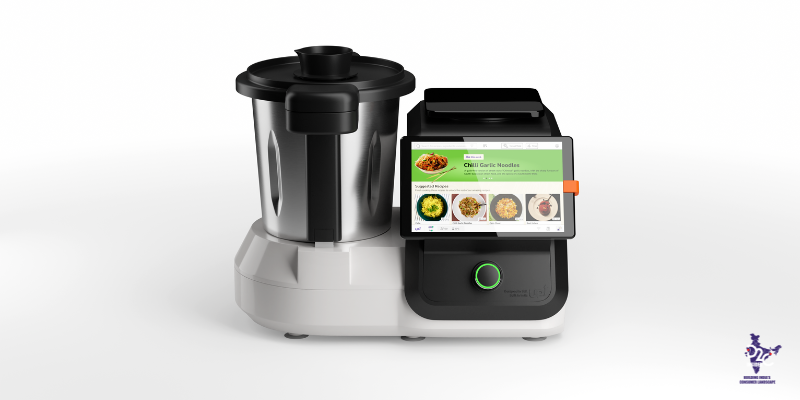Started in 2021, the firm is currently selling Delish Up, an automatic cooking device, which chops, sautés and cooks’ dishes without you breaking a sweat.
The food processor-resembling device, which uses a patented heating technology, has sold 250-300 units since January, majorly through referrals.

Unlike me, majority of my acquaintance and friends, are pretty cooking averse. And with the ease of food delivery from Zomato and Swiggy, not entering the kitchen is becoming a common phenomenon.
But that’s exactly Mahek Mody and his co-founder Mohit Sharma are trying to tackle.
“We believe people want homecooked meal but settle for outside food because learning how to cook and doing it every day, multiple times, can be a daunting task,” says Mody, co-founder, Upliance.ai, a home appliance start-up.
“But we want to give people the power of being able to cook food for themselves and their families,” Mody adds.
Hence, the former Ather Energy executive joined hands with Sharma to create smart home appliances, in August 2021. The IIT-Bombay batchmates initially wanted to create a smart refrigerator but decided against it as entering a consumer goods segment, which already has big players including Samsung and LG, would mean investing a large chunk of capital.
“We thought instead of entering a category, which already has so many brands, we should create a new product, and hence creating a new category in the process,” says Mody.
The co-founders then decided to invest their life saving, of ₹70-80 lakhs, and created the first prototype of Delish Up in August 2021.
Patented heating and other workings
Delish Up was born as the third product iteration. The automated cooking devise marries a few major factors involved in creating food. These include chopping, heating, stirring and cooling. With Delish Up, it all happens in one jar with the help of a few rotating blades.
The React Labs Pvt Ltd-run firm also claims to have a patent on the heating technology. Delish Up estimates the temperature of the ingredients in the jar, and decides how much heat to apply, according to Mody.

While making chilli garlic noodles on this device, I was surprised how little time I spent standing controlling the heat. Delish Up automate the temperature from sautéing to boiling, and switched off the device once the food was cooked.
An adjacent mini screen shows you the recipe with detailed steps for cooking. And the weighing scale provided is to measure the quantity of ingredients. There are also cooking tips in the step-by-step guide, such as scraping technique and peeling advice, which makes the process more involved.
Delish Up’s first model, which had 15-20 recipes, was distributed among 130 households in 2021. The current retail model was rolled out in January this year, after many tweaks were made through customer feedback.
“We removed the swaad anusar (according to taste) explanation with salt because that didn’t tell the exact quantity our users should add. Now the device tells them the exact quantity,” says Mody.
Now users can also choose to make food from over 250 recipes, and a new one is also added every week.
The firm also uses OpenAI’s ChatGPT feature, as ChefGPT, to suggest recipes and cooking hacks. Delish Up’s recipes can also be customised to dietary needs including dairy-free, gluten free, vegan and protein rich.
“You might also want to have Pav Bhaji. But a healthier version. Delish Up also suggests recipes with less butter and spice,” says Mody.
Sales and other endeavors
Upliance.ai, which currently has a team of 28 people, has sold about 250-300 units across Bengaluru, Mumbai, Delhi, Pune and Surat, completely through their website. Mody is confident of reaching 500 units within the next few weeks and pan India shipping by next month.
As the firm has been in operations for only the last six months, it would be difficult to ascertain any revenue numbers. The founders also claim to have spent almost nothing on marketing Delish Up.
“We get all of our orders through referrals,” he adds.
But going forward, while sales happen online there will also be an offline marketing push. Upliance.ai aims on marketing their product, through pop-ups, across food and technology events, and in stores.
The founding duo’s goal is to have Delish Up listed on Amazon, among other digital marketplaces, for the upcoming Diwali season.

The firm has also raised an angel round of $1.5 million, in 2022, from Zerodha’s Nithin Kamath, Tim Draper—backer of SpaceX, Angel List, and Twitter, founders of Ather Energy and Unacademy, in 2022.
After getting some scale with Delish Up, the founding team plans on getting back to developing a smart refrigerator, among other smart devices. “We are not going to let go of our first product idea because Indian kitchens will have more smart devices in the coming decade,” says Mody.
Potential consumer base
Delish Up’s consumer base is a bit hard to pin down at a price point of ₹21,999. But in Mody’s mind there is no doubt.
The co-founder claims they are going after households where home runners are below the age of 40, with no person in-charge of cooking or have a cook.
“Even with having a full-time cook, it would not always be possible to customize to being protein rich, low carb or free of gluten,” says Mody.
But with Delish Up there is variety, customisation and automation, which will help in deriving more users. The firm also has a 7-day return period for skeptical users. So far, the co-founder claims to have zero returns.
Currently, India’s household appliance market amounts to $74.49 billion, according to research firm Statista. The market is expected to grow by 5.65 percent compounded annual growth rate (CAGR) until 2028.
Automation in small and big home appliances seems to be on a rise across younger and legacy brands. Atomberg, which is backed by Steadview Capital and Temasek Holdings, has disrupted the small appliance category with energy-efficient fans.
Biggies including legacy appliance maker Usha has also jumped on the energy-efficient fan bandwagon, while Goldmedal Electric Pvt. Ltd. has created app-controlled switches, among other technological adoption.








